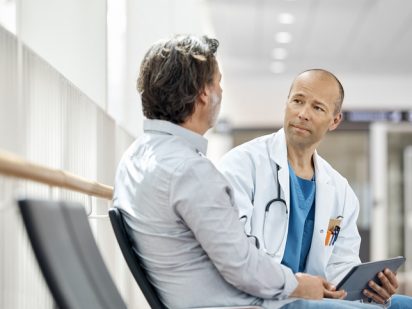“It’s not the procedure, it’s the prep.” That’s a common phase you might hear from someone reluctant to get a colonoscopy. Stories of having to drink a gallon of strange-tasting liquid have undoubtedly scared many away from taking advantage of the life-saving procedure, even though prep routines are easier to stomach than they used to be.
Ira Michaelson, MD, gastroenterologist with Trinity Health, confirms that colonoscopy preparation has improved in recent years, with better-tasting fluids and lower-dose regimens that make it easier to complete the prep process.
“Whatever people have heard; colonoscopy prep has improved,” Dr. Michaelson said. “The important point is that the prep is well worth the bother because the cleaner the colon, the better the exam. It’s easier for us to identify polyps and remove them before they become cancerous. If the prep is not done properly, you may have to reschedule your colonoscopy.”
The Centers for Disease Control and Prevention lists colorectal cancer as the third most common cancer in men and women (if you exclude some forms of skin cancer). It is the third leading cause of cancer related deaths in the U.S. In 2018, the latest year for which data are available, just over 141,000 new cases of colon and rectum cancer were reported. Some 52,163 people died.
“The good news is that while colorectal cancer is the third leading cause of cancer deaths, it’s also one of the most preventable,” Michaelson noted. “More than 90 percent of people survive if they take advantage of early screening to detect and remove pre-cancerous polyps.”
Colonoscopy uniquely provides this advantage. Pre-cancerous lesions called polyps can be removed during the exam, which means a colonoscopy can prevent cancer. Other screening methods such as home stool tests are also useful. If they produce a positive result, however, they must be followed up with colonoscopy.
The American Cancer Society recommends that regular screening to detect polyps begin at age 45 for typical individuals and earlier for people at greater risk. The greater risk group includes persons with a family history of cancer (especially colorectal cancer), people who tend to develop polyps, and those with a history of inflammatory bowel disease.
Persuading people to take advantage of timely colorectal screening remains a challenge for health professionals, but it is improving. According to the CDC, the percentage of U.S. adults aged 50 to 75 years who were up-to-date with colorectal cancer screening increased 1.4 percentage points, from 67.4% in 2016 to 68.8% in 2018. This represents an additional 3.5 million adults screened for colorectal cancer. That means fewer people are dying of colon cancer, but still more than necessary.
Screening is essential because colorectal polyps and colorectal cancer don’t always produce symptoms, especially early in the course of the disease. Someone could have polyps or colorectal cancer and not know it, which is why getting screened regularly for colorectal cancer is so important.
Symptoms, if they do appear, may include:
• A change in bowel habits
• Blood in or on a bowel movement
• Diarrhea, constipation, or feeling that the bowel does not empty all the way
• Abdominal pain, aches, or cramps that don’t go away
• Unexplained loss of weight
Research is underway to determine whether other factors, such as healthy lifestyle choices, can reduce colorectal cancer risk. Medical experts often recommend a diet low in animal fats and high in fruits, vegetables, and whole grains to reduce the risk of other chronic diseases, such as coronary artery disease and diabetes. Such a diet also may reduce the risk of colorectal cancer. Studies also suggest that increasing physical activity, limiting alcohol consumption, and avoiding tobacco could be helpful.
For more information about colorectal screening, contact your primary care provider or Trinity Health’s Gastroenterology Department at 701-857-7389. Assistance in finding a primary care provider is available by calling 857-DR4U.

